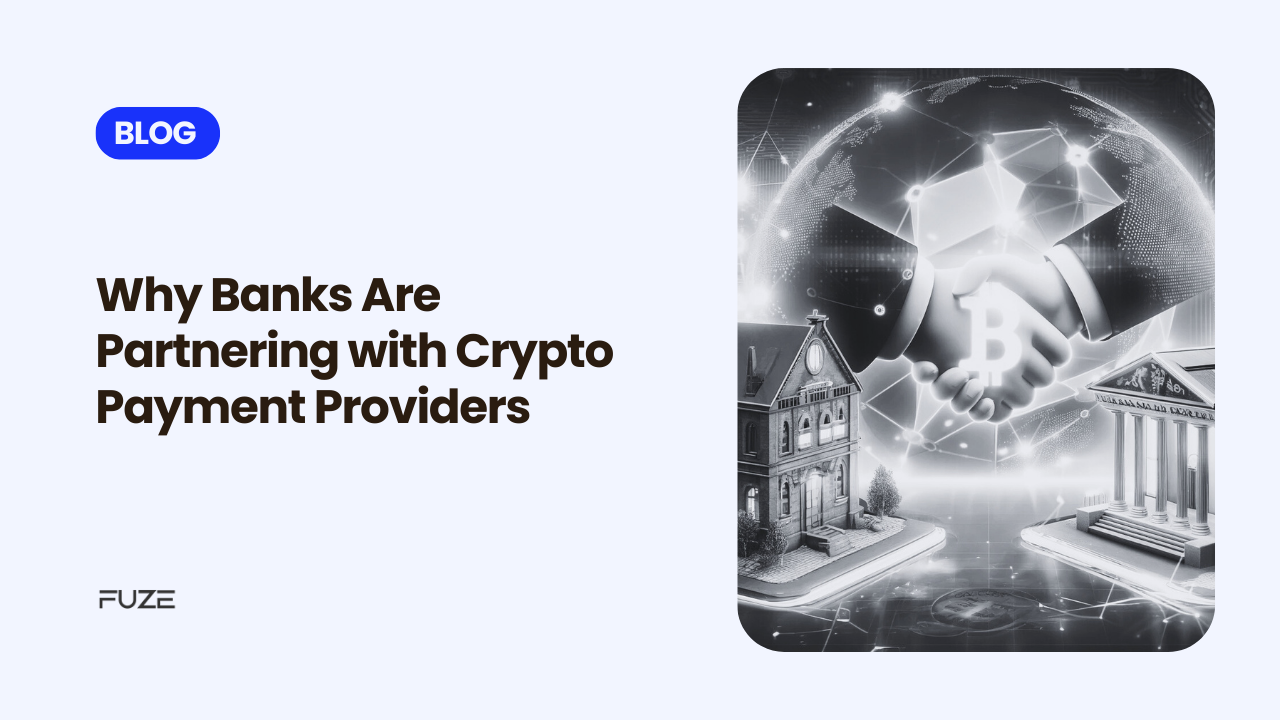In recent years, the financial industry has undergone significant transformations, especially with the growing prominence of cryptocurrencies. Traditional banks, once hesitant to embrace these decentralized digital assets, are now forging partnerships with crypto payment providers to cater to the increasing demand for blockchain-based solutions. These collaborations are not just a trend but a strategic shift that blends the best of both worlds – the security and trust of traditional banking with the speed and efficiency of blockchain technology. In this blog, we will explore the reasons behind this growing trend, the benefits of hybrid payment solutions, and the challenges banks face as they navigate the evolving digital landscape.
The Rise of Crypto and the Changing Financial Landscape
Cryptocurrencies have gained remarkable popularity over the past decade. The financial world has watched Bitcoin, Ethereum, and other altcoins make waves, with crypto adoption accelerating among retail users, investors, and businesses. As the digital asset market continues to grow, banks can no longer ignore the rise of these digital currencies, which offer several advantages over traditional financial systems:
- Faster Payments: Blockchain transactions are processed much quicker than traditional bank transfers, especially for cross-border payments. Where conventional international transfers can take days, blockchain transactions can settle in minutes or even seconds.
- Lower Fees: Crypto transactions often incur lower fees than traditional bank services, especially for cross-border payments, where fees can be prohibitively high.
- Increased Transparency: The decentralized nature of blockchain ensures that all transactions are visible to participants, fostering transparency and reducing the likelihood of fraud.
However, while cryptocurrencies hold immense potential, they also come with a unique set of challenges, including volatility, regulatory uncertainty, and limited integration with existing financial infrastructures. To bridge the gap, many banks are beginning to partner with crypto payment gateways, recognizing that hybrid solutions could offer the benefits of both worlds.
Reasons for Collaboration Between Banks and Crypto Payment Providers
1. Wider Customer Base and Increased Market Reach
One of the primary motivations behind banks partnering with crypto payment providers is the need to serve an expanding customer base. Cryptocurrencies have attracted a large segment of tech-savvy customers, especially younger generations who are interested in decentralized finance (DeFi) and blockchain technology. By offering crypto payment services, banks can appeal to this demographic and keep up with the rapidly evolving financial ecosystem.
These partnerships allow banks to offer digital currency services while maintaining their traditional services, providing an attractive, all-in-one solution for customers. This approach expands market reach and positions banks as forward-thinking financial institutions that understand and adapt to modern financial needs.
2. Access to Blockchain Technology and Enhanced Payment Solutions
Blockchain, the technology that underpins cryptocurrencies, offers several advantages over traditional payment systems, including faster, more secure, and cost-efficient transactions. By partnering with crypto payment providers, banks can leverage blockchain to enhance their payment solutions, especially in cross-border transactions.
Cross-border payments, which often involve multiple intermediaries, can take several days to process and are subject to significant fees. Blockchain-based payments eliminate the need for intermediaries, reducing both the time and cost of such transfers. Banks partnering with crypto payment providers can now offer faster, cheaper, and more transparent international payments to their customers, adding significant value to their services.
3. Improved Security and Fraud Prevention
The security provided by blockchain technology is another compelling reason for banks to explore partnerships with crypto payment providers. Blockchain’s decentralized nature ensures that no single entity can manipulate or alter transaction records, making it an attractive solution for enhancing the security of financial transactions.
Banks can integrate crypto payment systems to improve fraud prevention and reduce risks associated with hacking, chargebacks, and other fraudulent activities. Blockchain’s immutable ledger allows for better tracking and monitoring of financial transactions, providing banks with a more secure infrastructure for processing payments.
4. Regulatory Compliance and Legal Frameworks
Regulation has been one of the main obstacles for the widespread adoption of cryptocurrencies. Banks face strict regulatory compliance requirements, and the uncertain regulatory landscape of crypto has made them wary of fully integrating crypto services. However, the regulatory environment for crypto is rapidly evolving, with countries such as the U.S., the EU, and the UAE developing frameworks to guide crypto businesses and financial institutions.
For example, the UAE has introduced comprehensive regulations around crypto payments through the Abu Dhabi Global Market (ADGM) and the Dubai Financial Services Authority (DFSA). These regulations provide a clear path for banks to partner with crypto payment providers, ensuring that they comply with the necessary laws and safeguards.
As regulatory clarity continues to emerge, banks can confidently engage with crypto providers, knowing that their partnerships will adhere to the required legal frameworks. This fosters trust between banks, regulators, and customers.
5. Diversifying Revenue Streams
For banks, revenue diversification is essential, especially as interest rates remain low and traditional financial services become increasingly competitive. Offering crypto-related services such as crypto wallets, crypto savings accounts, or payments can serve as a new revenue stream. Banks can earn fees from crypto transactions, offer cryptocurrency trading services, or even provide advisory services to help customers navigate the volatile crypto market.
By partnering with crypto payment providers, banks can tap into these new revenue opportunities while maintaining their core banking business. This creates a win-win situation for both banks and their customers.
Hybrid Payment Solutions: A Win-Win for Banks and Crypto Providers
Banks and crypto payment providers’ collaborations are mostly hybrid payment solutions that combine the advantages of traditional finance with blockchain technology. Using fiat as well as crypto assets in a very fluid manner can be useful for businesses looking to integrate crypto payments while still relying on traditional financial systems for their day-to-day operations.
For instance, businesses that are accustomed to using traditional bank payment systems can integrate crypto payment gateways into their e-commerce platforms, enabling them to accept cryptocurrency payments while still processing traditional payments. Similarly, crypto holders can easily convert their digital assets into fiat currencies through partnerships between crypto providers and banks, ensuring liquidity and usability.
Challenges of Bank-Crypto Collaborations
While the benefits of bank-crypto partnerships are clear, there are several challenges that need to be addressed to make these collaborations truly successful:
- Volatility: Cryptocurrencies are highly volatile, and their value can fluctuate dramatically. Banks need to figure out how to manage these price swings while providing stable and reliable services to customers.
- Regulatory Uncertainty: Despite the increasing number of regulations in some countries, there is a lack of harmonization globally. Banks should be aware of the specific laws and regulations in varying jurisdictions.
- Technological Integration: Both parties require compatibility between their systems regarding security and the ability to handle high volumes of transactions.
- Public Perception: Many consumers are still skeptical about cryptocurrencies, and there is an ongoing education process to make them comfortable with using digital currencies for payments. Banks need to foster trust and educate their customers on the advantages and risks of using crypto payment solutions.
Conclusion
The collaboration of traditional banks and crypto payment providers is on the rise and underscores the urgent call for innovation in the financial sector. By combining the reliability and security of traditional banking with the speed and efficiency of blockchain technology, banks can offer hybrid payment solutions that cater to the changing needs of their customers.
These partnerships provide banks with opportunities to expand their services, improve customer experiences, and tap into new revenue streams. As regulatory frameworks continue to evolve and technological integration improves, we can expect more banks to explore the potential of crypto payment systems, ushering in a new era of seamless, secure, and efficient financial transactions.
As the financial world moves toward greater digitalization, banks that embrace crypto payment solutions will not only stay ahead of the curve but also help shape the future of payments in an increasingly decentralized world. Fuze plays a critical role in this transformation by providing seamless, secure, and compliant infrastructure, enabling banks to integrate crypto payments efficiently while meeting regulatory standards. Through its robust platform, Fuze helps banks bridge the gap between traditional financial systems and the dynamic world of cryptocurrencies, driving innovation and supporting growth in this rapidly evolving landscape.
Disclaimer: Virtual assets carry significant risks, including high volatility and potential loss of your entire investment. They are not backed by governmental protections, and recourse may be limited in case of loss. Always assess your risk tolerance, fully understand the risks, and seek independent financial advice if needed before investing.
Frequently Asked Questions
-
How can banks benefit from blockchain technology through crypto payment partnerships?
Blockchain technology, which underpins cryptocurrencies, offers numerous benefits to banks, such as enabling real-time transaction settlement, reducing operational costs, and eliminating intermediaries. It provides a secure and transparent system that enhances the efficiency of international payments, which is one of the key pain points for traditional banks.
-
Are crypto payment solutions safe for banks and their customers?
Yes, crypto payments can be safe when integrated correctly. Crypto payment providers usually implement robust security measures, including encryption and multi-factor authentication, to protect transactions. Banks partnering with reputable and regulated providers ensure that both they and their customers are protected from fraud and cyber threats.
-
What challenges do banks face when adopting crypto payment solutions?
Banks face several challenges, including regulatory uncertainties, technical integration complexities, and a lack of internal expertise on blockchain technologies. Moreover, customer trust in crypto solutions can be an obstacle. Banks must ensure that the crypto payment systems they adopt are fully compliant and meet all necessary legal and financial requirements.
-
What types of financial services are most likely to benefit from crypto payment solutions?
Services that involve cross-border payments, remittances, and large transactions stand to benefit the most from crypto payment solutions. These areas typically face high fees, long processing times, and limited access to international markets. By using cryptocurrencies, banks can reduce these inefficiencies and offer more competitive and accessible solutions.
-
How are banks integrating crypto payments into their existing services?
Banks are integrating crypto payment solutions into their existing services by allowing customers to make transactions in both traditional currencies and cryptocurrencies. Some banks are offering crypto wallets and trading services, while others are focused on providing businesses with the ability to accept crypto payments for goods and services.







